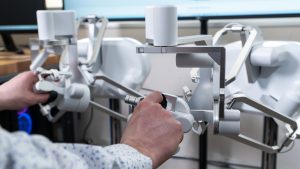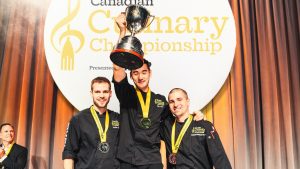In this Coping With COVID-19 podcast episode, OBJ speaks with three restaurateurs who have very different business concepts but have all been severely affected by the pandemic. The panelists include Marc Lepine from Atelier, Joelle Parenteau from Wolf Down and Elias Theodossiou from EVOO and Mati.
This is an edited transcript of the panel discussion. To hear the full interview, please watch the video above. Prefer to listen to the interview? Tune in on Soundcloud:
OBJ: Restaurants Canada estimates that 800,000 jobs have been lost in the past four weeks. Marc, let’s start with you. Give us an overview of your restaurant and tell us how it’s been affected by the pandemic and the business shutdown.
(Sponsored)

How Carleton is using simulation and visualization to improve training, design and human performance
From healthcare to aviation to architecture, simulation and visualization tools have become an essential part of training, analysis and decision-making in sectors that rely on precision. At Carleton University, researchers

For the fifth year in a row, Ottawa will become the epicentre of Canadian culinary excellence in late January. Chefs from Ottawa, Vancouver, Edmonton, Calgary, Saskatoon, Winnipeg, Toronto, Montreal, Moncton
LEPINE: We’ve been in operation for 11 years on Rochester Street. We serve 12-course menus. I have a staff of 17. We like to be experimental and use a lot of new technologies to bring our food to the table. We have a garden out back and farmland that’s not too far off. So we’re super passionate about that. The restaurant is a decent size. It was originally 20 seats and, maybe four or five years ago, we expanded. We’re now about 45 seats.
OBJ: Joelle, you’ve also got a very unique concept, which is somewhat new to Ottawa. Tell us about Wolf Down and how it has been affected?
PARENTEAU: Yes, Wolf Down is a German street food spot. That is something pretty new to North America. We focus on Berlin doners, which is the No. 1 street food in Germany. Somehow nobody here has heard of it. I was introduced to it by my fiancé Daniel, who is German. He is to blame for all of this. We kept coming back from Germany and saying we need to bring this to Ottawa. So with the backing and enthusiasm of Daniel and Tobi from Shopify we said let’s open this German street food spot. So with this COVID-19 crisis, our initial stance was that we hang in there and stay open as long as we could. However, the supply chain started to fail and kind of forced our hand. We, for example, get our bread from the amazing guys at Art-Is-in Bakery. They made the call to shut down, so that kind of trickled down. More recently we found there is a tofu shortage, the big slabs that we need to grill. That was a second punch to the gut. We’re hanging in. One day a week to at least keep our superfans fed. We are just kind of patiently waiting to get back in the game.
OBJ: Elias, let’s bring you back into the conversation. Give us a sense of your two restaurants and the impact of COVID-19.
THEODOSSIOU: Our first restaurant was EVOO, a Greek kitchen on Preston Street. We opened that one about six years ago. Mati, which is also on Preston Street, we opened a little over two years ago now. EVOO is a kind of traditional Greek restaurant. You know, it uses a lot of my mom’s recipes, food that I grew up with … Mati we opened in years three or four of EVOO, getting the itch to open a new restaurant. That’s the entrepreneur in me. I was travelling a bit and seeing what other types of restaurants were out there. You know, what restaurant concepts would work in Ottawa and just having some fun.
Of course, we’ve been impacted. Both of our dining rooms are closed. At EVOO, we always did Uber Eats at lunch and dinner. So the change is no dining room now. We have continued with Uber Eats and curbside pickup. At Mati, we’re offering sharing menus for two or four. We’re just going day by day, week by week. It’s an adjustment for sure.
OBJ: Marc, I want to come back to your decision to close the restaurant. Can you walk us through that decision, meaning why did you want to close instead of offering delivery or pickup options?
LEPINE: I had a conversation with our managers at the restaurant shortly after we were forced to close the dining room. I wanted to get a sense of how everyone felt about takeout. I wasn’t personally comfortable with it. Just, you know, if someone was to get sick, I would feel responsible. But I kind of left that decision to staff. No one was super keen about doing it. We were not sure how takeout would be received by our patrons, given our style. So we just decided to leave it.
OBJ: Joelle, it sounds like you have an evolving approach. You initially opted for pickup or delivery service. You’ve changed that now because of supply chain problems. Tell us about what’s happening.
PARENTEAU: Right. We were always on Uber Eats delivery service from day one. It’s actually a really great business model. So we thought, OK, we will double down on that. We were also doing pickup. Clients just had to order online and then grab and go. Now we’re reduced to being open one day per week. We’re missing so many of our supplies that we literally have about 20 per cent of our menu. This is completely out of our control. So we are down to being open only on Saturdays. We’re talking with Art-Is-In and trying to get the bread going in a couple of weeks. At that point, we can bring things back in phases, day by day.
OBJ: Elias, you talked about how you’re evolving with delivery and pickup. Some people might have the impression that restaurants can replace a lot of their revenue using this approach. I suspect that’s not the case.
THEODOSSIOU: Yes, revenue has dropped by at least 80 per cent. We have 75 per cent of our staff on employment insurance. We’re not doing even close to the revenue we would normally do. We have our chefs, sous chefs and some managers working. We closed down before we were forced to close. I wasn’t comfortable with what was happening. I went into quarantine myself because I have some health issues. I’ve been at home for five weeks now. So I did the same thing as Marc. I asked staff if they were comfortable going to work. It’s definitely a difficult time. I wanted to make sure everyone was on board, if they were going into work. They wanted to stay busy and keep going. That’s when we made our delivery menus and sharing menus. That has been changing week by week … I’m trying to focus on the positives, Mike. It’s very important at this time. It’s very easy to get bogged down. There’s a lot of negatives. I think the No. 1 thing for everyone right now is safety.


